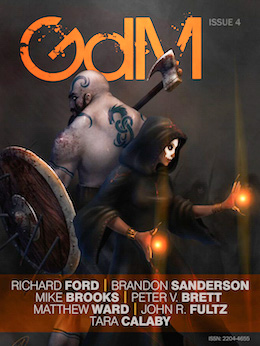Reviewed by C. D. Lewis
The fourth issue of Grimdark offers interviews, articles, excerpts, and four original short stories.
Matthew Ward’s “Brazen Dreams” is a dark SF heist short that goes wrong on an alien world. Told in close third, it follows Elida – a spymaster’s ambitious protégé – as she self-interestedly seeks to get ahead of her mentor. The story is set in the world in which the author has written a forthcoming full-length novel about the spymaster Vortane, and turns out to be at least as much about his cleverness in evading her schemes as it is about Elida and her dark choices. If you like dark fiction, man-machine interface elements, and tragic decisions that lead to personal disaster, “Brazen Dreams” is a short you should put on your list.
Tara Calaby’s “Ashes” opens on a fairytale ending, only to reveal Cinderella’s “happily ever after” for an horrific sham that leaves her crouching by the fireplace ash in nostalgia for the good old days when she was free to consort with birds and woodland animals while she labored. The story’s segments are delivered from the perspective of Cinderella, the Prince, and the Fairy Godmother – each sketching part of Calaby’s increasingly feverish epilogue to Cinderella. “Ashes” provides much more mood than it does story; the action does not so much follow a logical progression of causes and effects directed by character choices as it exposes the emptiness of the princess’ “happily ever after” while painting the Prince as a (possibly unwitting) jailer and raising questions about the nature of her fairy godmother and their relationship. The facts surrounding the princess’ flight and ultimate freedom aren’t clear – only Cinderella’s rejection of the expectations heaped upon her by her station following her marriage to the Prince. The conclusion suggests she begins a new story, and one wonders whether in it she’ll play the Fairy Godmother or perhaps enter an entirely new story and play the Beast.
Mike Brooks’s “Redemption Waits” opens on a space freighter docking with a space church repurposed as a house of sin capable of flying where there’s no law. Brooks’ spacefaring future contains characters described as Brazilian or Maori, at once suggesting cultures and races recognizable to readers even after the advent of interstellar flight. Some of the early dialogue evokes a heist’s introductory overdub, plainly for the benefit of the audience. The Wild-West-In-Space vibe plays to readers’ longing for another Firefly episode, as does the combination of near-gentlemanliness (prefer to buy than to rob, and to rob rather than murder) and unsentimental dismissal of battle’s aftermath. Story-structure purists may balk that there’s no hard, character-defining choice – but Brooks’ continuous conflicts, reversals, and reveals give the piece an exciting pace once the action begins. The protagonists’ fighting-smart approach, smartassed dialogue, and endless schemes make “Redemption Waits” a con/heist comedy worth reading.
“The Halfwyrd’s Burden” by Richard Ford, is set in a fantasy kingdom’s border wilds. The story’s initial law versus justice theme is traditional, but it isn’t carried into the climax and doesn’t fuel the story’s conclusion. The conflict’s backstory is laid out in conversations, which shields the reader from experiencing the wrongs that might hook their hearts.
The story doesn’t start with the background-establishing conversations, though. The tale opens on a description of a mountainous landscape rather than any action, so the first thing that hits the reader isn’t the characters or their conflicts. The first pages’ descriptions threaten to push one’s head from the story: I re-read the first paragraph a few times looking for sense in “a place so remote, when the rain pissed down like it was trying to drown you, and the wind howled and roared till it frayed your wits.” I may be alone in wondering what rain and wind prove about remoteness; others traversing the sentence may have become (in the opening paragraph’s own words) “lost quicker than a priest in a whorehouse.” It’s hard to engage with a story without a clue whom it’s about or what conflict it addresses; until page three we have no idea the protagonist hunts a fugitive. Until five pages in, there’s no interaction between any characters.
Readers willing to read on find a harsh land rich with conflicts between nations and men and gods, where life feels cheap and short. Chasing a vigilante killer always promises the risk of encountering a vigilante killer – a promise that eventually blossoms into action. Descriptions work against the action’s pace, though, to the point of leaving the protagonist “standing there with the knife in his hand, as much use as if he’d been holding his cock.” (No, I didn’t make that up.) When hunter and hunted make common cause against suddenly-appearing foreign invaders, the story abandons its law-vs-justice theme and ceases offering more than merely physical conflict. (Mention of their enemies’ “immortal lusts and cruelties” made me wonder whether their lusts and cruelties enjoyed great longevity, or a combination of immorality and poor spelling.) The deus ex machina conclusion seems to save the protagonist from the consequences of his decision; it may help build the world by revealing the personal interest of its gods, but it does little to convince us that the characters’ decisions matter or that characters will be required to pay the price of their choices. And without consequences that stick or decisions that matter, what’s there to care about in a story? It’s an interesting world worth re-visiting – through a different story.
C. D. Lewis lives and writes in Faerie.
 Grimdark
Grimdark